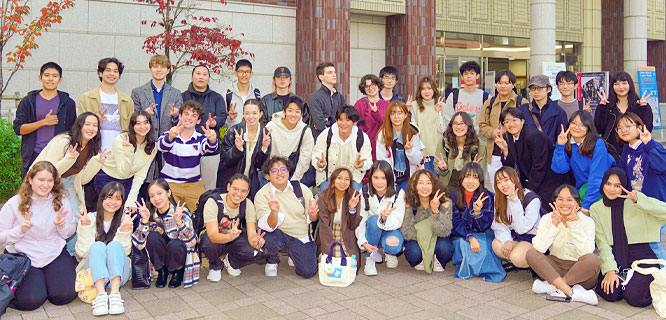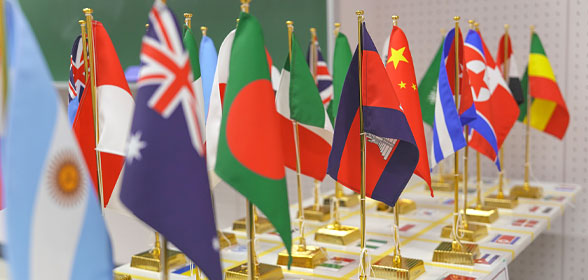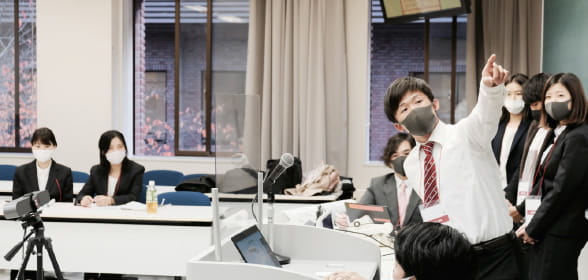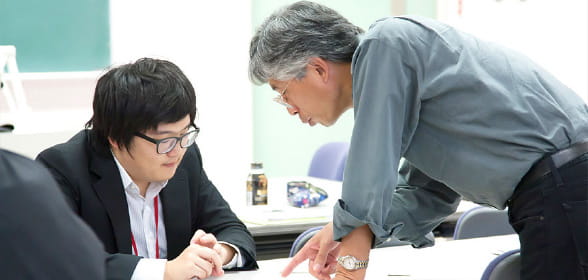Curriculum
- Global Studies Major
- American University Ritsumeikan University Joint Degree Program
- International Relations Major
- Often Asked Questions
Global Studies Major

Graduation requirements and courses
International Relations
In their first year, students will study Introductory Seminar I-II, General Education courses, and Foundation courses, where they will gain a foundation in the basic knowledge and skills necessary to study international relations. Beginning in their second year, they will dive deeper into a specialized subject in which they have an interest or concern. Specialized courses are broadly divided into the three following categories:
Foundation Courses- Theories of International Relations
- Politics for Global Studies
- Economics for Global Studies
- Sociology for Global Studies
- Macroeconomics
- Global Studies Research
- GOVERNANCE AND PEACE CLUSTER covers:
- Peace and Conflict Studies
- Security Studies
- International Human Rights
- International Law
- Global Political Economy
- International Organizations
- DEVELOPMENT AND SUSTAINABILITY CLUSTER covers:
- Global Environmental Issues
- International Development Cooperation
- International Finance
- International Trade and Investment
- North-South Relations
- Social Development
- CULTURE AND SOCIETY CLUSTER covers:
- Global Sociology
- Media and Society
- Cultural Awareness and Communication
- Topics in Identity
- Race and Ethnicity in the Modern World
- International Migration
Area Studies
In the College of International Relations, great importance is placed on learning about actual regions around the globe, not just theory. In their second year, students will take courses in area studies as they delve deeper into their study of the history and culture of an area that interests them.
- Introduction to Area Studies
- Advanced Topics in Area Studies
- United States Politics and Foreign Policy
- Foreign Relations of Japan
- Japanese Politics
- Business Administration in Japan
- Korean Studies
- Contemporary China
- Southeast Asian Studies
- Japanese Society
- Japanese Culture
- Japanese Economy
- Japan-United States Relations
- Modern Japanese History
Four Years of Small Group Education
Year one through year four will consist of ongoing group education. Through things such as discussions and presentations that are only possible in the learning environment of a small group, students will step by step, gain academic skills and the ability to complete their graduation research work.
After the completion of their second year, students will select a seminar course (Advanced Seminar) in which to participate for their remaining two years. While receiving advice from the seminar’s faculty advisor, students will pursue research on a theme of their choice, and in the last semester of their fourth year, they will consolidate and conclude their graduation research.
Four Years of Small Group EducationForeign Language Education
In the Global Studies program, there are no English language study courses. During their first year, students will take Academic Skills I–III. There they will acquire the skills necessary to study international relations in English, including reading, writing, presentation, and discussion.
In their first year, all students will select a second foreign language to study from French, German, Spanish, Chinese, or Korean. Students from overseas must choose Japanese.
In their second year, students wishing to continue their foreign language study may do so in intermediate and advanced-level language courses (advanced Xyz language, minor in foreign language communications, specialized foreign language course, etc.).

Study Abroad
Studying abroad is optional, but approximately 10%–30% of students in the Global Studies program participate in long-term (6 month–1 year) study abroad programs. For more information on Ritsumeikan University’s study abroad program, see the International Center’s study abroad program website.
Study Abroad



